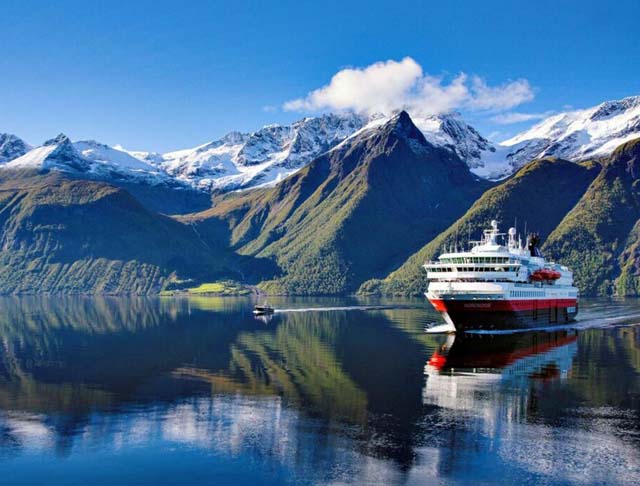After announcing plans to build its first zero emission ship by 2030, Hurtigruten Norway has now secured leading tech partnerships and applied for funds to embark on a research project to further develop the zero-emission ship concept.
The company has started a project to develop ships with zero emissions for the Coastal Express by 2030, its most ambitious sustainability initiative to date.
Hurtigruten Norway CEO Hedda Felin said: “The cost of going first is always higher than copying others a few years later. However, our environment is running out of time, and Hurtigruten Norway and our partners want to do our part and lead the way to zero emissions.”
According to Felin, only 0.1% of all vessels globally have zero emissions technology today, and the cruise industry is often seen as lagging behind on environmental action.
Felin said: “The progress towards sustainability in the cruise industry has been too slow, simply put. Consumers will not continue to accept the use of heavy fuel oil or climate targets that are way behind the Paris Accord. Zero emission ships are the game-changer the cruise industry needs.”
Hurtigruten Norway, in collaboration with research institute Sintef and a number of other partners, are on track with the Sea Zero-project of developing zero-emission ships customised for the Norwegian coast, and have submitted the first funding application for the next phase.
Trond Johnsen, Chief Market Developer, Sintef Ocean, said: “We have included a team of companies that can make the historic Hurtigruten ships emission-free and help make Norway a leader in green shipping. Now we hope to secure support for a major research and development project to create the technology and ship design that is needed.”
In August, a feasibility study looking at possible technology and fuel options for the new ships was completed. It points to modern batteries as a suitable choice for more environmentally friendly Hurtigruten ships. As only one seventh of the global energy today is renewable, and energy is becoming an even more scarce resource, energy efficiency will be a pillar in the Sea Zero project. Sintef’s scientists and engineers will examine all the systems and equipment in the new ship design to make sure each ship consumes the least energy possible.
An important part of the Sea Zero project has been to get industry-leading partners on board. 13 partners have signed on to the team, which will help pioneer new solutions for the industry.
Håvard Lien Vollset, VP Research and Innovation, Vard, said: “Vard is proud to be a part of the Sea Zero project and to support Hurtigruten and the project team in the search for the optimal zero emission coastal cruise ship. We will build upon recent years’ experience in designing and building state of the art expedition cruise ships for the most demanding conditions. In this project the focus will be on the environmental aspects, minimising the overall impact for a sustainable coastal cruise. An important mission we are highly motivated to pursue and a natural building block in our ZeroClass portfolio.”
Partners in the Sea Zero project are: Hurtigruten Norway, Sintef, Cavotec, Vard, Brunvoll, Plug, Corvus Energy, DNV, Sustainable Energy Catapult, Teknotherm, Jotun, Norwegian Maritime Authority and Bergen Port.



